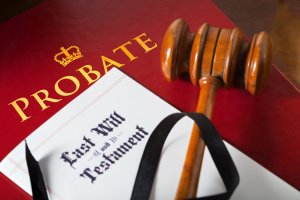Fill out the form for Delaware Administrator Probate Bond and Guardian / Conservator Probate Bond
What is a Probate Bond in Delaware?
A probate bond is a type of fiduciary bond (also known as an executor’s bond) in a probate court estate. It is a Delaware state court bond that is issued on the performance of an executor or administrator of an estate. The purpose of the bond is to protect the beneficiaries or creditors of the estate from harm caused by the malfeasance or negligence of the executor or administrator.
In Delaware a probate court bond is issued to administrators, executors, conservators and guardians in probate estates.
See our Connecticut probate bond page here.
 How Much does a Probate Bond Cost in Delaware?
How Much does a Probate Bond Cost in Delaware?
The cost of a probate bond can vary widely depending on the amount of coverage that is required. It is based on the total amount of the estate, including any real estate, that the fiduciary has to oversee. The bond premiums are normally calculated at one-half of one percent (0.8%), which is equal to $500 for every $100,000 of estate assets. We work diligently to find the lowest premiums possible in the state of Delaware. Please call us today at (979) 314-2999. We’ll find you the very best rate possible.
| Bond Amount Needed | Fee |
| <$20,000 | $100-$150 |
| $20,000-30,000 | $150-$200 |
| $30,000-50,000 | $200-$300 |
| $50,000+ | 0.5-0.8% |
These rates are for Merit clients, Preferred rates are 0.5% and Standard rates are 0.5 to 0.8%
How do I get an Estate Bond in Delaware?

We make it easy to get a probate bond. You can click here to get our Probate Application. Fill it out and then email it, along with the court documents requiring the bond, to [email protected] or fax to 855-433-4192. The fastest way?
You can also call us at (979) 314-2999. We review each application for an executor bonds and then submit it to the surety that we believe will provide the best fidelity bond for your estate. They will perform a credit check. We have a high success rate in getting our clients probate estate bonds at the best rates possible.
Probate Bonds in Delaware: Everything You Need to Know
From our perspective, probate bonds are an essential safeguard when administering an estate in Delaware. These bonds ensure that the executor or administrator handles the estate’s assets responsibly, protecting beneficiaries and creditors from potential mismanagement. Required by the court in many probate cases, a probate bond offers peace of mind, ensuring that the estate’s assets are distributed according to the law. Let’s dive into the key aspects of probate bonds in Delaware, including how they work and why they’re necessary.
Learn How to Secure an Estate Bond in Delaware
From our perspective, securing an estate bond in Delaware is a straightforward process, but it requires attention to detail. Probate bonds, also known as estate bonds, are often required when someone is appointed to handle the estate of a deceased person. These bonds ensure that the executor or administrator will perform their duties faithfully. To get started:
- Contact a surety company that offers probate bonds: The first step is to find a surety bond provider who specializes in probate bonds. These are specific to managing estates, so not every surety company offers them. Look for companies experienced in Delaware probate law.
- Provide necessary information such as the estate’s size and your role: We’ve noticed that surety companies require details about the estate’s total value and your role (executor, administrator, or trustee). This helps assess the risk involved in issuing the bond.
- The surety will assess your financial standing before approving the bond: Based on our experience, surety companies perform a financial evaluation of the executor or administrator to ensure they can responsibly manage the estate. Credit checks or personal asset reviews may be part of this process.
Find the Right Probate Bond Provider Near You

What we’ve discovered is that finding a reputable probate bond provider in Delaware can make all the difference. Many local and national surety companies offer these bonds, and it’s essential to choose one with experience in probate matters. Here are a few options:
- Local surety agents with Delaware-specific knowledge: Working with local surety agents familiar with Delaware laws gives you an advantage. They can guide you through the state-specific requirements for probate bonds.
- Online platforms that specialize in probate and fiduciary bonds: In our opinion, online platforms offering probate bonds are a convenient option. They often provide competitive pricing and allow you to compare surety companies. Just make sure the platform is reputable.
- Law firms that can refer you to trusted providers: Based on our experience, probate lawyers often have relationships with surety bond providers and can refer you to a trustworthy company. This can be a great resource if you’re working with an attorney for estate matters.
Understand Why Probate Bonds Are Critical for Estate Protection
In our opinion, probate bonds play a crucial role in protecting the estate’s beneficiaries. A probate bond ensures that the executor or administrator manages the estate’s assets ethically and responsibly. These probate surety bonds serve as a guarantee that if any malfeasance occurs, the beneficiaries are protected. Here’s how they safeguard the estate:
- Stealing from the estate: Probate bonds act as a financial safeguard against theft. If an executor takes funds or assets from the estate for personal use, the bond compensates the beneficiaries.
- Mishandling assets or failing to pay debts: We’ve found that probate bonds protect against the mismanagement of assets. This includes failing to pay off debts or making poor financial decisions that harm the estate.
- Failing to distribute assets according to the will or court instructions: Probate bonds hold the executor accountable for following the will or court orders. If the executor doesn’t distribute the assets correctly or promptly, the bond ensures the beneficiaries can recover losses.
Discover How Probate Bonds Function in Court

We’ve noticed that probate bonds play a critical role in the legal process once they’re filed with the probate court. They act as a form of legal insurance, holding the executor accountable for their actions. Here’s how they work:
- The bond ensures estate management adheres to legal standards: Probate bonds act as a legal safeguard, ensuring the executor manages and distributes the estate according to state laws.
- Beneficiaries or creditors can file a claim if misconduct occurs: Probate bonds empower beneficiaries and creditors to hold the executor accountable. If they believe misconduct or fraud has occurred, they can file a claim with the bond company.
- If the claim is valid, the surety company compensates the estate up to the bond amount: The bond company will investigate claims, and if misconduct is found, they will pay out damages up to the bond’s value. The executor may need to repay the surety company for any funds paid out.
Identify Who Benefits Most from a Probate Bond
Based on our experience, probate bonds primarily benefit the estate’s beneficiaries. Here’s how these bonds protect them:
- Their inheritance is safeguarded: Probate bonds give beneficiaries peace of mind, ensuring that the executor or administrator will not misuse estate funds. The bond protects their rightful inheritance.
- Any financial losses due to mismanagement are recovered: In our opinion, probate bonds serve as a financial safety net. If the estate’s assets are mismanaged, beneficiaries can file a claim against the bond to recover any lost funds.
Explore the Different Court Bonds in Delaware
In our observation, many people confuse probate bonds with other court bonds. While probate bonds specifically apply to estate management, there are other types of bonds that courts may require:
- Appeal Bonds: Appeal bonds are required if someone wants to appeal a court decision. These bonds ensure that the appealing party will cover any costs or damages that may result from the appeal.
- Injunction Bonds: Injunction bonds are required when a party asks the court for an injunction or restraining order. They protect the opposing party from financial losses if the injunction is later found to be unjustified.
Follow These Steps to Obtain a Probate Bond
We’ve learned that obtaining a probate bond in Delaware can be a straightforward process if you follow these steps:
- Contact a surety bond company and provide details about the estate: Start by providing details about the estate’s size, assets, and your role as executor or administrator.
- The surety company evaluates your financial background and risk: The surety company will assess your financial standing, including credit history and personal assets, to determine whether you’re a trustworthy candidate.
- Once approved, the bond is filed with the probate court: After approval, you must file the bond with the probate court, which finalizes your role as executor or administrator.
- Pay the necessary premium, often a small percentage of the bond’s value: The premium for a probate bond is typically 1-3% of the bond’s total value. This fee keeps the bond active throughout the probate process.
Takeaways on Delaware Probate Bonds
 Our experience tells us that probate bonds are essential for protecting the interests of estate beneficiaries in Delaware. These bonds ensure that the executor follows the legal process and manages the estate responsibly. If you’re managing an estate or concerned about how the assets are being handled, a probate bond could provide the security you need.
Our experience tells us that probate bonds are essential for protecting the interests of estate beneficiaries in Delaware. These bonds ensure that the executor follows the legal process and manages the estate responsibly. If you’re managing an estate or concerned about how the assets are being handled, a probate bond could provide the security you need.
Looking for more guidance? We recommend consulting with an expert or exploring surety bond services to find the right solution for your probate needs.
We provide probate bonds in each of the following counties:
Kent
New Castle
Sussex
See our Florida probate bond page here.
Fill out the form for Delaware Administrator Probate Bond and Guardian / Conservator Probate Bond


